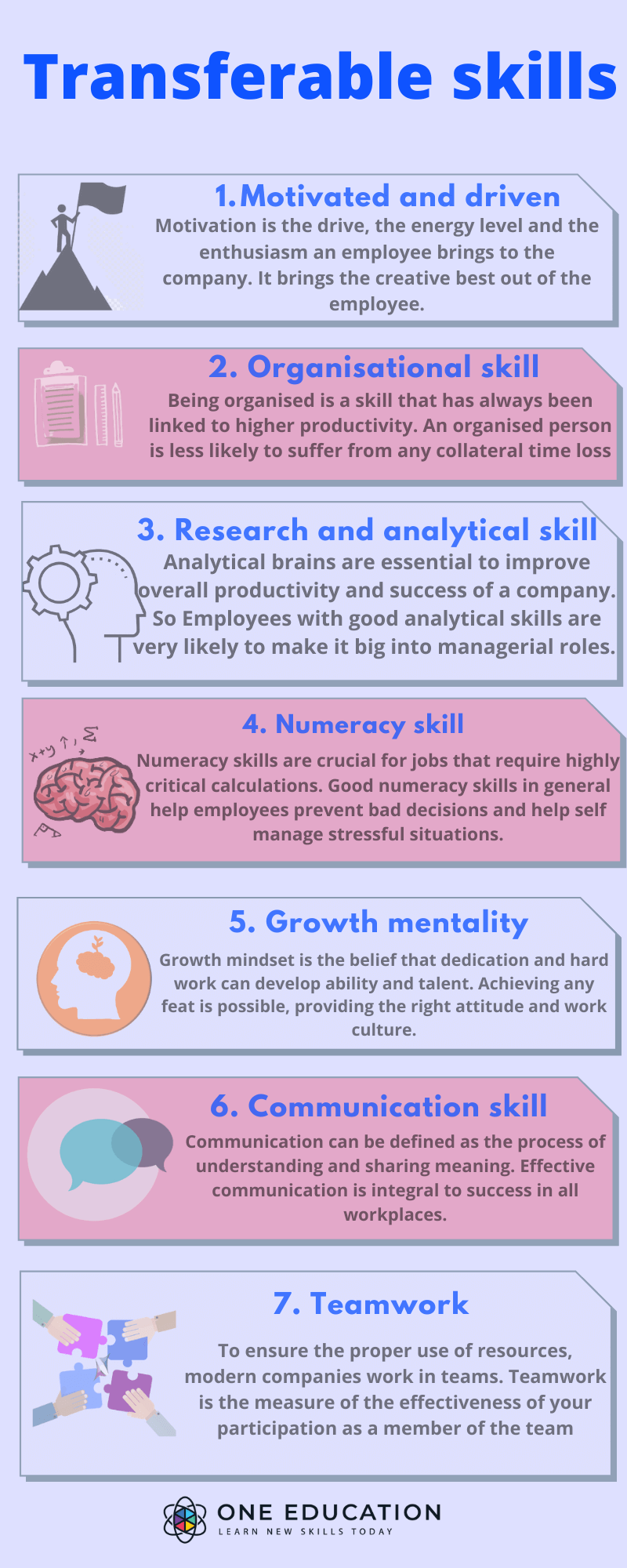Employability Skills: A Guide to Skills Employers Look For


![]() 24 minutes
24 minutes

5213 Viewers
Employability skills act as the bridge between your abilities and the responsibilities you have to carry out at your job. Employability skills are the core traits, attitudes, and state of minds that are important for facing the workplace challenge. So your success at work depends a lot on how well you accustom yourself to the essential skills.
This article will discuss the key skills employers look for in their employees. You also learn in detail about making the perfect CV to land you the dream job.
Table of Contents
What is employability skill?
By definition, employment skills are the skills that make a person suitable for employment. To carry out a job role, an employee needs the relevant subject knowledge and a clear understanding of the process. In the modern workspace, jobs are divided into segments and different teams are assigned to work on each segment. So apart from the technical skill required for the job employers look for certain flexibilities in their employees that helps things get finished. These are employability skills. As you read on you will find out more about it.
Different people are born with different abilities. So success may look different to every individual based on their Employability Skills and attributes. But accommodating the critical skills to your day to day life is destined to bring you success. These skills motivate employers to choose one candidate over the others.
Having relevant knowledge of the appropriate industry may get you a call for an interview. But by having the types of employability skills, you may be able to cross the ground and get your dream job. The reason why employers
What are the skills employers look for?
Technical skills and knowledge can just get past the initial application stage. Other aspects, such as personal qualities, attitudes, and general aptitudes, are critical to ensure the job. So employability skills mainly refer to as the transferable skills that remain the same for all jobs.
In the modern workplace, a challenge is always waiting for the employees. You will regularly face setbacks too and criticism. But that does not mean you can give away so quickly to any such circumstances. Modern employees need to stay calm under pressure and face the challenge of life your job throws at you every day.
A positive attitude towards the work you do has to combine with professionalism such as punctuality, alertness, and communication ability. Though this may sound a lot plain to some of you working requires a specific amount of flexibility living within all the rules.
Most of the time, you just need to capture the right attitude to start with. The rest will just come along with time.
Transferable skills employers look for
Transferable skills are the skills and abilities that can be helpful across different areas of life. These are the people management skills that people acquire through various stages of their life. Transferable skills help people effectively socialise with people proactively.
You can implement soft skills to your academic, personal, social, and all aspects of your social life. So they are also sometimes termed as portable skills. Employers these days are always after employees who can demonstrate a high level of transferable skills.
So of the primary transferable skills are:
It’s not always about working hard or working long hours. Instead, it can kill your motivation for work. A smart worker will still be able to figure out his priorities. Being driven will enable him to identify the correct order to carry out his tasks. Smart working is about identifying your skill-set and building a strong point. So working smart will bring positive motivation to your work. As a result, you will be able to give back your best to the company. Motivation is the drive, the energy level and the enthusiasm an employee brings to the company. It brings the creative best out of the employee. So it is one of the critical aspects to gain organisational success. The results of motivation are as follows: To work effectively in a group, you need to be aware of your time. Being motivated brings a sense of purpose to a person’s life. In addition, it brings a sense of direction the people look for so badly. Once you have joined the job, it’s necessary for you to stay motivated and to look forward. Otherwise, your progress may get barred. So employers are always looking for motivated personalities who can keep on growing with the company. Instead, it’s necessary to unlock everyone’s full potential. Learn more about Smart Marketing by checking out our latest blog post, Smart Marketing: Insights from Top Product Marketing Experts.
1. Motivated and driven
Employers are always looking to improve the productivity of their employees to reach maximum efficiency. And being organised is a skill that has always been related to achieving higher productivity. To start if you are well-organised, you are significantly less likely to suffer from any collateral time loss. Being well-organised eventually means you get more time to complete your assigned works. As a result, you get to work more freely. On another note, organised people are less likely to suffer from job-related stresses. Some major advantage of being organised at the job are: Organising is a fundamental employability skills that makes the ground for many other higher-level skills such as planning and management. So, to make it big, becoming well organised is where you can start.2. Organisational skill
In the modern-day where everything is dependent on information skills like collecting and analysing information, problem-solving and making decisions are sought after like gold. Employers always keep an eye out for employees with excellent analytical skills to help solve their problems. Analytical brains are very much essential to improve the overall productivity and success of a company. Analytical skills allow people to find solutions to various problems and make concrete decisions. So they are instrumental in designing action plans to solve problems in any organisation. Employees with good analytical skills are very likely to make it big into managerial roles as the gift is more relevant to upper-level management.3. Research and analytical skill
Numeracy skills are crucial for jobs that require highly critical calculations. Good numeracy skills in general help employees prevent bad decisions and help self manage stressful situations. The confidence achieved by higher numeracy is helpful to make everyday life solutions easy. The advantages of higher numeracy skills are: Numeracy skill is a core skill that overlaps with several other types of tasks for employees of all levels. Employers always have high regard for good numeracy skills right from the top to bottom of their organisation. 4. Numeracy skill
A growth mindset is a belief that dedication and hard work can develop ability and talent. Achieving any feat is possible, providing the right attitude and work culture. The primary condition of building up a growth mindset is: Personal growth and development are crucial to become the best potential person you can be. Employers look for people with the mindset to grow and help reach the maximum capacity to meet goals. You can attain personal growth just by achieving new Employability skills and applying simple changes to your approach. In addition, another attribute needed to help you achieve the growth mindset is to blow off all setbacks. The characteristics for achieving the growth mindset are: 5. Growth mentality
6. Time management
Time management is a skill that impacts anyone’s life in general. Dividing your time well helps you improve your work, social, family as well as academic life. Adapting to hours well will instantly raise your ability to get things done and prioritise activities the right way. So becoming a good time manager enables you to take control of your life.
Employers while hiring, and even after recruitment, employers regularly evaluate the employee’s time management capabilities.
The benefits of efficient time management at the workplace are:
Effective time management means an organised and planned division of time at work. Setting up goals and assessing your time for each one is the key to become a good time manager.
Time management is crucial to create the necessary work structure. Good time managers are less likely to suffer from occupational stress. As a result, proper mental health is also ensured.
[/su_note]
Communication skills refer to how productively you can interact with your team members. To work as a team, you will have to collaborate with a lot of people. Strong understanding is essential among co-workers working in collaboration. So good listening skill is a must. Such skills are necessary for both professional and private life. Communication can be defined as the process of understanding and sharing meaning. Effective communication is integral to success in all workplaces. Proper communication between employees can eliminate a lot of unnecessary problems in the workplace and promote better performance. Similarly, the ability to communicate effectively in the workplace can increase productivity and create a well-functioning team. Employers spend a lot of time and resources to create a good understanding among the team members. So having clear and strong communication skills is always an added advantage for anyone looking to get hired. Effective communication creates trust among employees. It results in increased productivity, performance and overall team morale. In any business, verbal and written communication skills are essential to quickly and accurately deliver and understand information. Likewise, being a good listener is also taken into account. So effective communication is a vital life skill and highly sought after by all kinds of employers.7. Communication skill
Listening is one of the frontal parts of learning. So top-notch listening skill is essential to understand the processes involved in a task correctly. Being an unmindful listener can lead to costly mistakes and lost opportunities. That is why companies always look for employees with the right conception of listening. Listening
Most jobs these days require some extent of proficiency in writing skills. Communication among co-workers usually occurs through e-mails and slack texts. Even contact with the customers also takes place with readers through the web and media. So in today’s world where communication is everything good writing skill is always likely to be in demand.Written communication
Staff members with strong verbal skills are sought after by employers of all industries. Good speaking skills enable staff members to communicate thoughts and ideas among themself clearly and effectively. On the other hand, it saves a lot of time and ensures productivity. With the inclusion of diverse people in workplaces, effective verbal communication is also updating fast. Operations in a work environment can get very complex at times. So there is always a high demand for well-versed employees in any workplace.Verbal communication
To ensure the proper use of resources, modern companies work in teams. Teamwork is the measure of the effectiveness of your participation as a member of the team. So it’s unnecessary to mention how vital teamwork is in today’s workplace. Modern workplaces are all designed for employees to work in teams. Working in groups has made it possible for everyone’s strengths and weaknesses to give each other space. As a result, team members get to learn from each other and provide the best output. Employers these days emphasise an individual’s capacity to work in groups rather than his skills. So the workplace is no longer a place for lone rangers. Everyone needs to adapt to the practices of working in a team. A team environment fosters friendship and loyalty. To have a meaningful lifelong career, you need to work well with others, so teamwork is vital in the professional world.
8. Teamwork
These close-knit relationships motivate employees:
Employers highly sought problem-solving skills as these skills often relate to confident individuals and self-sustained individuals. Problem-solving skills include a range of competencies such as logic, creativity, resilience, imagination, lateral thinking and determination. Problem-solving skills are essential for managers and all senior-level roles. Individuals with problem-solving skills are resilient to hard work and challenges. The steps of the effective problem-solving process are as follows: All jobs need employees to face complex business challenges. Employers look for candidates’ ability to handle such situations. So along with technical skills, they also emphasise creativity and problem-solving capabilities. This inspires quick learners with excellent analytical skills to join the workforce. By problem-solving skills, we mean the ability to solve problems relevant to the workspace. The method involves identifying the issue and the phenomena that have been causing the issue. Employers highly regard employees who can come up with practical solutions to solve specific workplace problems.9. Problem-solving skills
As good leaders can bring the best out of the team members leadership is an essential skill in the workplace. Good leaders motivate their team to increase employee engagement, employee retention and ultimately, overall productivity. So leaders need to be good role models. The role of leaders in the workplace are as follows: As a team leader, it’s essential to make sure everyone in the team has the proper instruction. So leaders are great communicators as well. The skill of leadership is a conglomerate of10. Leadership
Attention to detail refers to the ability to achieve thoroughness and accuracy. Employers appreciate the constructive efforts of employees to notice small details. Attention to detail reduces the loss of resources. Critical thinking abilities are sought after by companies to promote efficiency at work. It helps one make logical connections between arguments. So one can be more analytical and think rationally. 11. Attention to detail
Work ethic is the employee’s willingness to carry out his job responsibilities. Reliable employees with a vital moral principle are sought after by every organisation. They increase the performance of the organisation to many folds. Positive work ethics are a precondition to reach high-quality work standards.12. Strong work ethic
It’s roughly referred to as the ability to understand and balance one’s feelings. Not addressing your emotions will create bitterness for work. Without complying with dynamic bindings, a person may suffer from sudden emotional outbursts. So it’s a very healthy skill to carry to your workplace.13. Emotional intelligence
Constructive criticism is the sharing of valid rational opinions in a friendly manner. It is vital to promote a learning atmosphere and a growth mentality. By facing criticism, you become more involved and always open to learning.14. Open to constructive criticism
In today’s technology-driven world, it’s indispensable to be tech-savvy. Tech friendly employees to communicate efficiently with each other at work. Good digital literacy will enable you to extract more useful information about your customers. Using the online platform, you can create better marketing strategies for your company.15. Tech-savvy
Making the perfect resume
A curriculum vitae or cv is your profile. The first thing you must keep in mind while writing a CV is how it looks at first glance. Even if you fit the requirements, a clumsy CV might not appeal to employers.
So it is necessary to tailor your CV to gain the attention of the hiring manager. Some CV writing pro-tips for beginners are as follows:
Remember, while conducting a job search, your CV will represent you to the recruiter. Your CV can be different based on the specification of the job you are applying for. So it’s crucial which skills for the CV you want to highlight.
Things to include in a CV
The CV is the document that gives your first impression to the employer. So it’s essential to make sure you don’t miss out on any critical points.
Instructions for filling out a CV template are as follows:
Put personal details such as your name, contact details on the top of the CV. These are e-mail, phone number and locations. Try to focus your name as the title. Put your LinkedIn as well.1. Personal details
The Personal introductory also termed the about me section Define who you are, your attributes, and your objectives. Write a short paragraph in not exceeding 2-3 sentences. This section is your chance to stand out from others. Try to be fair and avoid any cliche.2. About me section
Add all your relevant work experiences in this section. Try to detail your experiences. Use bullet points if necessary. If you are a fresher then place your educational qualification before work experience.3. Work experience
Use this section to highlight all your achievements over the years. Include all your co-curricular activities to distinguish yourself from other candidates.4. Achievements
Include your educational qualifications in this section. Sort them in order. Include the names of institution, dates, qualification followed by your grade. As a fresher, your educational qualification may exceed your work experience. So In that case place this section above the work and achievements section.5. Education
You can add things that interest you that might give value to your CV. But try to make relevant ones that might help. Write playing football. Instead of watching football, if that’s the case. Having common interests with the interviewer will give you a common ground to talk about to the interviewers. Always remember to add a relevant cover letter to your CV to get the most out of the job opening. Here is a blog you can read to learn about writing a cover letter.6. Interests and hobbies
The about me segment in the CV is the highlight of your CV that describes your greatest strength and abilities. You can use this section to showcase why you stand out from all other candidates. So this is the section you need to improvise the most. Make sure you are clear about the following points in the ‘about me’ area:Tips for writing an about me section
Related:
1. How to Become an HR Professional: A Career Guide
2. 8 Administrative Office Skills: Employers Are Looking For
3. 10 Rights of Employees in the Workplace You Should Have
4. How to Set SMART Goals to advance your Career
Here is a useful link for you to build a CV online.
You may have already gone through a few job notices. You may have noticed that employers sometimes ask for a resume instead of a CV. Both might seem the same, but there are a few differences. Let us decode the difference between CVs and resumes for you.CV vs Resume
The abbreviation form of CV is curriculum vitae. It shares information about your education, achievements, research publication in chronological order. CVs also include professional courses, skills, even your hobby and interests. It consists of a high level of details about your achievements. They may be 2-10 pages long. CV always remains static. You may update qualifications from time to time in your course of life.CV
Resume formats are very different from a CV. It may be no longer than one or at best two pages. An overview is a summary of career history. It may include a statement stating your career goals and objectives. It is a list of professional experiences from the most recent to the earliest order. Everywhere in the world, including the UK, India and other European countries use CVs. Across the pond, in the United States and Canada resumes are more popular. CVs are for any academic or research positions in the USA. Resumes are for applying to public and private sector jobs. A resume can fit the purpose of different jobs upon a simple edit.Resume
Expert tips for appearing interview are as follows:
Concluding Remarks
The ones, as mentioned above, are the critical skills employers look for. Use your common sense. Figure out what skills and experiences might suit the job and gain the employer’s attention. Don’t lose motivation. We all know Steve Jobs got kicked out of his own company. Your Employability Skills can save you, not your destiny. Try to add to your portfolio these in-demand skills to gain the employer’s attention. You are good to go as you may have noticed already that you possess most of them anyway.
Recent posts
- What is Safeguarding in Health and Social Care
- How the SENCO Role Transforms Pupils & Parents
- 20 Must-Have Excel Skills for Professionals in 2025
- What are the Different Types of Disabilities?
- How to Promote Diversity in Early Years (Learn the Secrets)
- How to Become Good at Math Overnight (is it Really Possible?)
- Safeguarding Responsibilities in Schools: Challenges and Solutions
- How Old Must You Be to Buy Paracetamol
- The Health and Social Care: Stress-Free Service Guide
- Launch Your Dream Blog in 2025: A Step-by-Step WordPress Setup Guide
The latest
Never Miss An Update
Get weekly industry tips sent straight to your inbox





Important Links
With a team of industry professionals producing and delivering our course content, you can be sure the skills and knowledge you learn are applicable to your career aspirations, whether that’s in management, administration or beyond.












